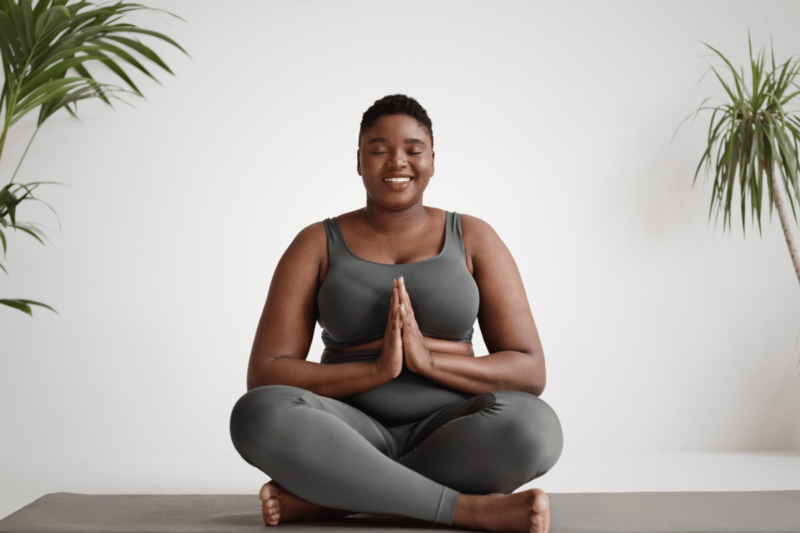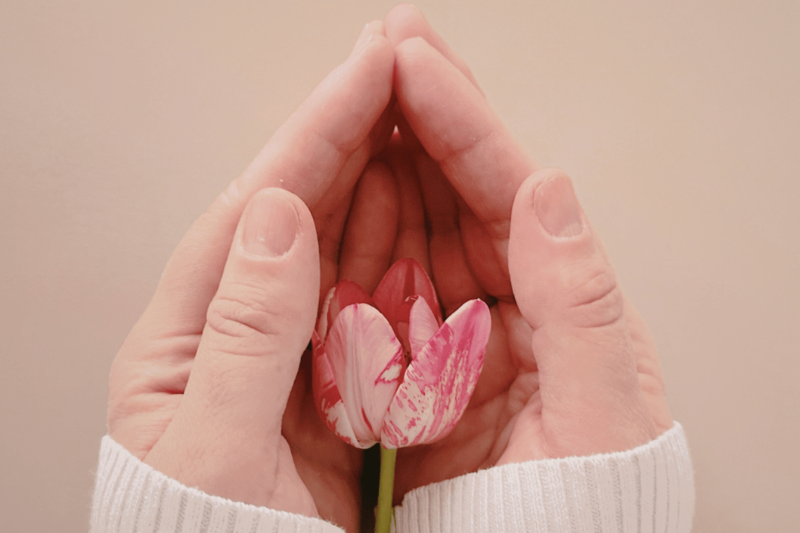It happens to all of us. You see a picture of yourself or your reflection in a shop window and you don’t like what you see.
You’re getting ready for an event and you hate how your clothes look on you.
You see someone you haven’t seen in years and they’ve lost weight (or just look more “put together” than you feel).
You feel socially awkward or otherwise out of place, and you’re instantly convinced that if your body was smaller you’d feel more confident.
You’re in a body image spiral and you’re in danger of circling the drain.
If you’ve ever heard the phrase, “Comparison is the thief of joy,” it might resonate with you when you think about those moments that feel like a gut punch to your body image.
When something triggers a downward spiral, what can you do?
Compassionate self-talk
Saying a phrase to yourself at those times can be helpful. For example:
- “Yes, this is my body, and in that moment, this is what it looked like. I wish it looked different, but it’s MY body and it’s carried me through my life so far and it will continue to do so.”
- “I’m grateful to have this body, even if I feel conflicted about how it looks. I know I am very far from experiencing body dissatisfaction and society has a lot to do with it. Besides, I wasn’t born feeling this way about my body.”
- “Ouch. It hurts the way I feel about my body right now. But this too shall pass and I’m not going to let negative thoughts take up space in my head and stop me from going out/engaging with others/living the my life”.

Lens shift
It can also help reorient your connection to your body. When you’re dealing with a body image disorder, you almost always feel bad ABOUT your body. An antidote to this is to invest back IN your body.
For example, when your negative feelings about your body or appearance come from seeing your image or reflection, or from comparing your appearance to someone else’s, you are focusing the lens on yourself from the outside. You are self-objectifying yourself.
When you bring yourself back into your body, you change your lens to look outward. You incarnate and re-engage with the world. A few things that may help with positive integration:
- Meditation. Meditating while using the sensation of your body’s breath, or your body where it meets your seat/pillow/floor, as an anchor point for your attention can help in a number of ways. It can facilitate unhooking from unhelpful thoughts, it can bring you back to the present moment and center your experience in your body.
- Grounding exercises. Lie on the floor or ground (perhaps on a blanket on your lawn), or sit in a chair with your feet flat on the floor and your knees bent at 90 degrees (yes, this matters) and notice your body breathing as you feel where you make contact with the floor. Imagine the ground supporting you and sending you energy as your body “roots” into the ground.
- Go for a walk. Bonus if you can do this in a park, neighborhood green, or other green space. The combination of nature, movement and the feel of your feet on the ground can be both grounding and good for mental health.

Emergency self care
There are five areas of self-compassion and self-care. Some of the items listed could serve as “emergency self-care” when you’re in a downward spiral of body image. Others are a long-term investment that can help avoid future spirals.
Physical self-compassion: It soothes or relieves your body when you are under stress
- Take a nap
- Eat nutritious food
- Go for a walk
- Do some yoga
- Take a warm bath or shower
- Pet a dog or a cat
- Enjoy some sun
- Get a massage
- I am on vacations
Emotional self-compassion: Treat yourself to intrinsically pleasurable activities (ie, not activities that feel like work)
- Listening music
- Reading a novel
- Garden work
- Riding a bike
- Going to a movie
- Cooking a delicious meal
- Going to church
- Taking a vacation
Mental self-compassion: Learning to “Keep Your Thoughts Light”
Self-compassion relationship: Connect with others. Isolation can escalate low moods or anxiety
Spiritual Self-Compassion: Take time to cultivate the values that are important to you

The benefit of perspective
It’s easy to see a friend or family member who has lost weight and think, “Well, they did it, what’s my problem?” The reality is that we don’t really know what someone did to lose weight (unless they tell us in excruciating detail, which is painful in another way, as in painfully uncomfortable, unwanted, and tedious)
They are also likely to regain some or all of the weight, through no fault of their ownbut because this is what happens in the majority of cases of intentional weight loss.
If you notice thoughts or feelings around being less than worthy, this may be something to explore. Are these feelings related to not meeting certain idealized standards of appearance, or are they related to the idea that you are lazy and that if you worked harder, your body and/or appearance would be “better”?
Consider this: There’s nothing wrong with caring about how we look (there’s also nothing wrong with not caring). If you care about your appearance and investing in your appearance is adaptive—it’s safe and contributes to positive body image—that’s good self-care. But if they are maladaptive, then they can cause harm.
Examples of adaptive investments in appearance include basic grooming, choosing clothes you like and feel good in, and maybe things like dying your hair, shaving or painting your nails. Examples of non-adaptive investments include dieting, obsessive exercise, wearing clothes that make you uncomfortable (because you think they make you look thinner or otherwise “fit in”), spending money on beauty treatments you can’t really afford and in many cases plastic surgery.
The bottom line is that your worth is not tied to your looks, weight, or how “fit” you are. Perhaps you need to remind yourself of the ways in which you add value to the world, whether through your family, work, volunteer work, creativity, or the way you care for pets or the environment (birds, bees , plants, soil, water ).

Talk to your inner critical voice
Because we have judgmental, ugly voices inside our heads that criticize us for not being perfect, for silly blunders, for the appearance of our bodies? Why don’t we treat ourselves with the same love and respect we give others? The critical voice is the fear of speaking. It’s the mind’s way of trying to protect us and keep us safe when the world is harsh. When events occur that cause you to suffer, your inner critic may place the blame on you.
What is a statement that your critical voice likes to repeat to you? What is he afraid of?
Speaking with compassion to our critical voice (“I know you’re scared and I know you’re trying to help, but I want you to understand that you’re not actually helping”) and to yourself (“Wow, it really hurts when my critical voice starts yelling”) may be useful.
Dear critical voice, my scared child, what do you really want? How would you feel, scared part of me, if I could do/be what you want?
You may have to get curious and dig deep to discover the true desire. In other words, the real desire is not to be thinner, to dress better, or to be more attractive. It’s more likely to be something like belonging, being loved, being competent, being safe. There is a list of basic human needs below.
When you identify that desire, that basic need, that life-enhancing quality, then you have something to work on immediately. And this will help you find more physical peace and relax your critical voice.

Basic Human Needs
Autonomy
- selection
- freedom
- independence
- space
- spontaneity
Connection
- acceptance
- affection
- assessment
- which belong
- cooperation
- Contact
- proximity
- community
- company
- compassion
- visa
- cohesion
- empathy
- inclusion
- intimacy
- love
- reciprocity
- nursing
- respect / self-respect
- security
- security
- stability
- support
- to know and be known
- to see and see
- to understand and be understood
- confidence
- warmth
Honesty
- authenticity
- integrity
- presence
Sense
- awareness
- celebration of life
- challenge
- clarity
- adequacy
- consciousness
- contribution
- creativity
- discovery
- effectiveness
- effectiveness
- development
- hope
- learning
- mourning
- participation
- purpose
- self expression
- stimulation
- for it to matter
- understanding
Irene
- beauty
- society
- ease
- equality
- harmony
- inspiration
- Series
Physical well-being
- air
- food
- movement/exercise
- rest/sleep
- sexual expression
- security
- refuge
- touch
- water
I am playing
Carrie Dennett, MPH, RDN, is a registered dietitian nutritionist based in the Pacific Northwest, freelance writer, intuitive nutrition consultant, author, and speaker. Her superpowers include; debunking nutritional myths and empowerment of women feel better about their bodies and make food choices that support pleasure, nutrition and health. This post is for informational purposes only and does not constitute personalized nutrition or medical advice.
Looking for 1 on 1 nutritional advice? Carrie offers a 6-month Food & Body program (intuitive eating, body image, awareness, self-compassion) and a 4 month IBS management program (How-FODMAP diet coaching with an emphasis on increasing food freedom). Visit the links to learn more and book a free introductory call to see if the program is a good fit and if we’re a good fit!
![]() Print this post
Print this post
